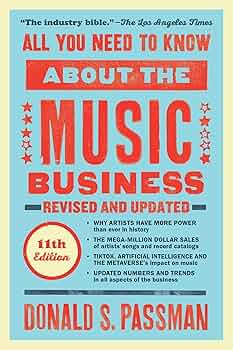

When it comes to succeeding in the highly competitive music industry, having all the necessary knowledge and understanding is essential. That’s why we’ve put together this insightful guide on “all you need to know about the music business”, providing you with a comprehensive overview of the key aspects involved.
Editor’s Notes: “All you need to know about the music business” has been published to provide valuable insights into the inner workings of the industry, empowering aspiring musicians, industry professionals, and music enthusiasts alike.
Through extensive analysis and research, we’ve compiled this guide to help you navigate the complexities of the music business. Whether you’re an aspiring artist, a seasoned professional, or simply passionate about music, this guide will equip you with the knowledge you need to make informed decisions and succeed in your musical endeavors.
Key Differences:
| Traditional Music Business | Modern Music Business | |
|---|---|---|
| Distribution | Physical releases (CDs, vinyl) | Digital streaming platforms |
| Revenue Streams | Album sales, touring | Streaming revenue, brand partnerships |
| Marketing | Radio, print advertising | Social media, influencer marketing |
Transition to Main Article Topics:
All You Need to Know About the Music Business
The music business is a complex and ever-evolving industry. To succeed in this competitive field, it’s essential to have a solid understanding of its key aspects. Here are eight essential elements of the music business that every aspiring artist, industry professional, and music enthusiast should know:
- Artists and Musicians: The foundation of the music business, creating and performing the music that drives the industry.
- Record Labels: Companies that finance, produce, and distribute music, providing artists with resources and support.
- Music Publishing: Manages the rights and royalties associated with musical compositions, ensuring creators are compensated for their work.
- Music Production: The process of recording, mixing, and mastering music, transforming raw performances into polished tracks.
- Live Performance: Concerts and tours allow artists to connect with their fans directly and generate revenue.
- Music Marketing and Promotion: Strategies and tactics used to promote music and build an artist’s brand.
- Music Technology: Tools and platforms that are revolutionizing the way music is created, distributed, and consumed.
- Music Business Law: The legal framework that governs the music industry, protecting artists’ rights and ensuring fair practices.
These key aspects are interconnected and interdependent, forming a complex ecosystem that supports the creation, distribution, and enjoyment of music. Understanding each aspect’s role and how they work together is crucial for navigating the music business successfully.
Artists and Musicians
Artists and musicians are the heart and soul of the music business. They create and perform the music that drives the industry, captivating audiences and shaping culture. Understanding their role and contributions is essential for anyone seeking to navigate the intricacies of the music business.
- Creation and Performance: Artists and musicians are responsible for creating the raw material that fuels the music industry. They write songs, compose melodies, and perform live, bringing their unique talents and perspectives to the world.
- Emotional Connection: Music has a profound ability to connect with people on an emotional level. Artists and musicians have the power to evoke joy, sadness, nostalgia, and a wide range of other emotions through their performances and creations.
- Cultural Impact: Music plays a significant role in shaping culture and society. Artists and musicians often reflect and influence the social and political landscape through their lyrics and performances, inspiring change and raising awareness.
- Economic Engine: The music industry generates substantial revenue through album sales, streaming, live performances, and merchandise. Artists and musicians are key drivers of this economic engine, contributing to the livelihoods of countless individuals.
In conclusion, understanding the role of artists and musicians is paramount in comprehending the music business. They are the foundation upon which the industry is built, creating the music that captivates audiences, drives cultural change, and generates economic value.
Suggested read: Unveiling the Secrets of Artist Business Cards: Tips and Tricks for Unmatched Impact
Record Labels
Record labels play a crucial role in the music business by providing financial backing, production expertise, and distribution channels for artists. Understanding their functions and the services they offer is essential for navigating the complexities of the industry.
- Financial Support: Record labels provide artists with advances and investments to cover recording costs, marketing expenses, and other expenses associated with music production and promotion.
- Production Expertise: Labels have access to experienced producers, engineers, and studio facilities, ensuring that artists have the resources they need to create high-quality recordings.
- Distribution and Marketing: Record labels have established distribution networks and marketing channels to get artists’ music to audiences. They handle physical distribution (CDs, vinyl) and digital distribution (streaming platforms, online stores).
- Artist Development: Labels often provide guidance and support to artists in developing their careers. This includes helping them build their brand, manage their finances, and navigate the legal aspects of the music industry.
In summary, record labels are essential partners for artists, providing the financial, creative, and logistical support they need to succeed in the music business. Understanding the role of record labels is a key component of “all you need to know about the music business”.
Music Publishing
Music publishing is an integral component of the music business, ensuring that songwriters, composers, and other rights holders are fairly compensated for their creative contributions. Understanding the role and functions of music publishing is essential for anyone seeking to navigate the complexities of the industry.
Music publishing involves the management of various rights and royalties associated with musical compositions. These rights include:
- Mechanical Rights: The right to reproduce and distribute musical compositions in physical or digital formats, such as CDs, vinyl, and streaming platforms.
- Performance Rights: The right to publicly perform musical compositions, such as in concerts, on radio, or in films.
- Synchronization Rights: The right to use musical compositions in conjunction with visual media, such as in movies, TV shows, and advertisements.
Music publishers play a crucial role in protecting and administering these rights on behalf of songwriters and composers. They negotiate licensing agreements with various entities, such as record labels, streaming services, and film studios, to ensure that creators receive fair compensation for the use of their works.
Additionally, music publishers provide a range of administrative and support services to their clients, including:
- Copyright Registration: Registering musical compositions with copyright authorities to protect the rights of creators.
- Royalty Collection: Tracking and collecting royalties from various sources, such as record sales, streaming, and public performances.
- Artist Development: Providing guidance and support to songwriters and composers in developing their careers and protecting their interests.
In summary, music publishing is a vital aspect of the music business, safeguarding the rights and ensuring fair compensation for those who create musical compositions. Understanding the role and functions of music publishing is essential for anyone seeking to succeed in the industry.
Music Production
Music production is a crucial aspect of the music business, as it involves the technical processes that transform raw musical performances into polished, high-quality recordings. Understanding the role and significance of music production is essential for anyone seeking to navigate the intricacies of the industry.
- Recording: The initial stage of music production involves capturing the raw performances of musicians and vocalists using microphones and other recording equipment. This process requires technical expertise to ensure optimal sound quality and accurate representation of the musical intent.
- Mixing: Once the individual tracks are recorded, they are combined and balanced in a process called mixing. Mixing engineers use various techniques to adjust volume levels, panning, equalization, and effects to create a cohesive and immersive soundscape.
- Mastering: The final stage of music production, mastering involves optimizing the overall sound of the recording. Mastering engineers use specialized tools and techniques to enhance the clarity, loudness, and consistency of the audio across different playback systems.
- Collaboration and Technology: Music production often involves collaboration between artists, producers, and engineers, each contributing their expertise and creativity to the process. Advanced technology and software tools play a significant role in enabling efficient and precise production techniques.
In summary, music production is a multifaceted process that lies at the heart of the music business. It encompasses the technical skills and artistic vision required to transform raw musical ideas into polished and captivating recordings. Understanding the role and significance of music production is essential for anyone seeking to succeed in the industry.
Live Performance
Live performance is an integral aspect of the music business, enabling artists to connect with their fans on a personal level and generate significant revenue. Understanding the role and significance of live performance is essential for anyone seeking to navigate the complexities of the industry.
Suggested read: Franchise Business for Sale – Find Profitable Opportunities Near You
- Fan Connection and Engagement: Live performances provide a unique opportunity for artists to interact with their fans directly, creating a shared and memorable experience. Concerts and tours allow fans to witness the energy and passion of live music, fostering a deeper connection and loyalty.
- Revenue Generation: Live performance is a major source of income for artists. Ticket sales, merchandise sales, and other revenue streams generated from concerts and tours contribute significantly to their financial success. Touring can also help artists expand their fan base and increase their overall visibility.
- Artistic Expression and Growth: Live performance allows artists to express their creativity and connect with their audience in a raw and unmediated way. It provides a platform for experimentation, improvisation, and spontaneous interactions that can enhance their artistry and deepen their connection with their fans.
- Industry Impact: Live performance plays a vital role in the music business ecosystem. It supports the livelihoods of countless individuals, including musicians, crew members, venue staff, and promoters. Live music events also contribute to local economies and tourism.
In summary, live performance is an essential component of the music business, providing a vital connection between artists and their fans while generating significant revenue. Understanding the role and significance of live performance is crucial for anyone seeking to succeed in the industry.
Music Marketing and Promotion
Music marketing and promotion are essential aspects of the music business, as they involve the strategies and tactics used to promote music and build an artist’s brand. Understanding the role and significance of music marketing and promotion is crucial for anyone seeking to navigate the complexities of the industry.
- Building Brand Identity: Music marketing and promotion help establish and reinforce an artist’s brand identity. This includes developing a consistent visual aesthetic, crafting a compelling narrative, and creating a unique brand voice that resonates with the target audience.
- Audience Engagement: Effective music marketing and promotion strategies engage the target audience and foster a sense of community around the artist. This involves utilizing social media platforms, creating interactive content, and running targeted advertising campaigns to connect with fans and build a loyal following.
- Media Outreach: Media outreach is a crucial aspect of music marketing and promotion, as it involves generating positive media coverage and reviews for the artist’s music. This includes building relationships with journalists, music critics, and tastemakers, and providing them with compelling stories and exclusive content.
- Digital Marketing: Digital marketing plays a significant role in music marketing and promotion, as it encompasses a wide range of online strategies to reach and engage the target audience. This includes search engine optimization (SEO), social media marketing, email marketing, and influencer partnerships to increase visibility, drive traffic to the artist’s music, and generate leads.
In summary, music marketing and promotion are essential components of the music business, as they encompass the strategies and tactics used to promote music, build an artist’s brand, and connect with the target audience. Understanding the role and significance of music marketing and promotion is crucial for anyone seeking to succeed in the industry.
Music Technology
Music technology has emerged as a transformative force in the music business, revolutionizing the way music is created, distributed, and consumed. Understanding the connection between music technology and the broader music business landscape is crucial for anyone seeking to succeed in this dynamic industry.
Music technology encompasses a wide range of tools and platforms that have had a profound impact on various aspects of the music business:
- Music Creation: Digital audio workstations (DAWs), virtual instruments, and other music production software have made it easier and more accessible for artists to create and produce high-quality music from their home studios.
- Distribution and Streaming: Streaming platforms such as Spotify, Apple Music, and SoundCloud have revolutionized the way music is distributed and consumed. These platforms provide artists with global reach and allow fans to access vast catalogs of music on-demand.
- Music Marketing and Promotion: Social media platforms, online advertising, and music analytics tools have become essential for artists to promote their music, connect with fans, and track their progress.
The integration of music technology into the music business has brought about several key benefits:
- Increased Accessibility: Music technology has made it easier for aspiring artists to enter the music business and showcase their talent, regardless of their location or financial resources.
- Global Reach: Streaming platforms and online distribution channels have given artists the ability to reach a global audience, breaking down geographical barriers.
- Data-Driven Insights: Music analytics tools provide artists and industry professionals with valuable data and insights into audience behavior, enabling them to make informed decisions about their music and marketing strategies.
Understanding the role and significance of music technology is essential for anyone involved in the music business. By embracing these tools and platforms, artists and industry professionals can unlock new opportunities, enhance their creativity, and navigate the ever-changing landscape of the music industry.
Music Business Law
Music business law forms an integral part of “all you need to know about the music business” as it establishes the legal framework that governs the music industry. Understanding this legal landscape is essential for artists, industry professionals, and anyone seeking to succeed in the music business.
Music business law encompasses various legal aspects, including:
- Copyright Law: Protects the rights of creators over their musical compositions, recordings, and other works.
- Contract Law: Governs agreements between artists, record labels, publishers, and other parties involved in the music business.
- Intellectual Property Law: Safeguards the rights to trademarks, patents, and other forms of intellectual property in the music industry.
- Entertainment Law: Addresses legal issues specific to the entertainment industry, including artist management, venue contracts, and licensing agreements.
The importance of music business law lies in its role in protecting artists’ rights and ensuring fair practices within the industry. It provides a legal framework that:
Suggested read: Uncover Business Analyst Intern Insights: A Gateway to Success
- Protects Intellectual Property: Copyright law safeguards artists’ creations from unauthorized use or infringement, ensuring they receive due credit and compensation for their work.
- Facilitates Business Transactions: Contract law provides a legal basis for agreements between artists and industry partners, ensuring clarity and fairness in business dealings.
- Promotes Ethical Conduct: Music business law establishes ethical standards and guidelines for industry practices, preventing exploitation and promoting transparency.
- Resolves Disputes: Legal mechanisms provide avenues for resolving disputes and conflicts within the music industry, ensuring that the rights of all parties are protected.
Understanding music business law is not only crucial for safeguarding artists’ rights but also for navigating the complex legal landscape of the industry. By being aware of their legal rights and responsibilities, artists and professionals can make informed decisions, protect their interests, and contribute to a fair and equitable music ecosystem.
| Scenario | Legal Implications |
|---|---|
| An artist signs a recording contract without legal counsel. | The artist may not fully understand their rights and obligations under the contract, potentially leading to unfair terms or exploitation. |
| A music producer uses a sample from another artist’s song without permission. | Copyright infringement may occur, resulting in legal consequences and potential financial penalties. |
| A venue cancels a concert due to unforeseen circumstances. | Contract law will determine the rights and obligations of the parties involved, including issues of liability and compensation. |
FAQs on “All You Need to Know About the Music Business”
This section addresses frequently asked questions (FAQs) related to the music business, providing concise and informative answers to common concerns and misconceptions.
Question 1: What are the key elements of the music business?
Answer: The music business comprises various interconnected elements, including artists and musicians, record labels, music publishing, music production, live performance, music marketing and promotion, music technology, and music business law.
Question 2: How can artists protect their intellectual property?
Answer: Copyright law provides a legal framework to protect artists’ intellectual property, safeguarding their creations from unauthorized use or infringement.
Question 3: What is the role of a music producer?
Suggested read: Unlock the Secrets of Apple Maps: Discover the Path to Business Success
Answer: Music producers oversee the technical aspects of music production, including recording, mixing, and mastering, to transform raw musical performances into polished recordings.
Question 4: How can artists build a strong brand identity?
Answer: Music marketing and promotion strategies, such as developing a consistent visual aesthetic, crafting a compelling narrative, and creating a unique brand voice, help artists establish and reinforce their brand identity.
Question 5: What is the impact of streaming platforms on the music industry?
Answer: Streaming platforms have revolutionized music distribution and consumption, providing artists with global reach and allowing fans to access vast catalogs of music on-demand.
Question 6: How does music business law contribute to the industry?
Answer: Music business law establishes a legal framework that protects artists’ rights, ensures fair practices, facilitates business transactions, and provides mechanisms for resolving disputes within the industry.
Suggested read: Unveil the Secrets of Business Professional Outfits for Women: A Guide to Success
Understanding these FAQs provides valuable insights into the complexities of the music business, empowering artists, industry professionals, and enthusiasts with the knowledge they need to navigate and succeed in this dynamic field.
Transition to the next article section:
Now that we have covered the basics, let’s delve deeper into the specific aspects of the music business to gain a comprehensive understanding of its inner workings.
Tips for Navigating the Music Business
The music business is a complex and ever-evolving industry, but with the right knowledge and strategies, aspiring artists, industry professionals, and music enthusiasts can increase their chances of success. Here are five essential tips to help you navigate the intricacies of the music business:
Tip 1: Understand the Legal Landscape
Familiarize yourself with copyright law, contract law, and other legal aspects of the music business to protect your intellectual property, ensure fair agreements, and avoid potential legal pitfalls.
Tip 2: Build a Strong Team
Surround yourself with a team of trusted professionals, such as an entertainment lawyer, music manager, and booking agent, who can provide guidance, support, and industry connections.
Tip 3: Embrace Music Technology
Leverage music technology tools for music production, distribution, and promotion to enhance your creativity, reach a wider audience, and stay competitive in the digital age.
Suggested read: Unlock the Secrets of Coaching Business Coaches: Discoveries for Business Success
Tip 4: Develop a Comprehensive Marketing Strategy
Create a comprehensive marketing plan that outlines your target audience, marketing channels, and promotional strategies to effectively promote your music and build a loyal fan base.
Tip 5: Stay Informed and Adapt
Keep up with industry trends, emerging technologies, and best practices to stay ahead of the curve and adapt your strategies accordingly to succeed in the ever-changing music landscape.
By following these tips and gaining a comprehensive understanding of the music business, you can increase your chances of navigating the industry successfully and achieving your musical goals.
Conclusion
The music business is a multifaceted and dynamic industry that encompasses a wide range of interconnected elements. Understanding the key aspects, legal framework, and industry practices is essential for navigating and succeeding in this competitive field. This comprehensive guide has provided an overview of “all you need to know about the music business,” empowering you with the knowledge and insights to make informed decisions and pursue your musical endeavors effectively.
To thrive in the music business, it is crucial to embrace ongoing learning, adapt to technological advancements, and build a strong network of professionals. By embracing these principles and cultivating a deep understanding of the industry, you can unlock opportunities, maximize your potential, and contribute to the vibrant tapestry of the music ecosystem.






